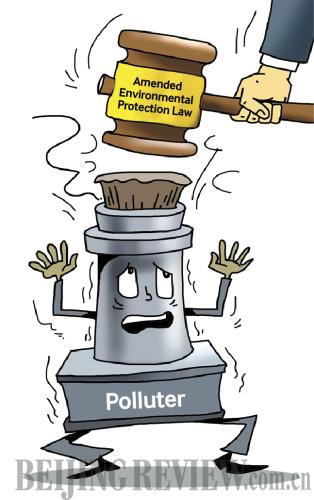 |
|
(XINHUA) |
Tougher punishments
Though pollution prevention and control have been on the top of the Chinese Government's agenda for years, problems still persist.
According to a report issued in April, nearly 60 percent of areas monitored in China last year had a "very poor" or "relatively poor" underground water quality.
Another report issued jointly by the MEP and the Ministry of Land and Resources on April 17 showed that about 16.1 percent of the country's soil is polluted.
Above all, heavy smog caused by industrial activities, coal burning and motor vehicles' emissions, which have frequently shrouded Beijing, Shanghai and other major cities across China over the past few years, causes the most concern.
Decades of rapid economic growth have taken their toll on China's ecology, while disturbingly lenient penalties have allowed for runaway environmental pollution, experts say. They warn that facing mounting public discontent over a deteriorating environment, strict implementation of the new Environmental Protection Law is more important than ever.
The latest round of reforms aimed at steering the country to transform its growth pattern is believed to offer a unique opportunity to address the issue.
At the annual full session of the NPC in March, Premier Li Keqiang "declared war" on pollution and pledged to fight it with the same determination with which the country battles poverty.
Echoing Li's declaration, lawmakers have hammered out harsher penalties for polluters and written them into the new Environmental Protection Law.
The law stipulates that enterprises will be named and shamed for breaking environmental protection laws.
According to the law, responsible persons will face up to 15 days in detention if they are found guilty of the following: Their enterprises skirt around environmental impact assessments and refuse to suspend production after receiving a ban; they fail to obtain a pollutant discharge permit but discharge pollutants, and refuse to suspend the discharge after administrative bodies issue a ban; or they shirk supervision through means including forging monitoring data or improperly operating pollution prevention equipment. The length of their detention will depend on the impacts of their violations.
It has also been stipulated that responsible persons should face the same punishments if their enterprises produce or use forbidden pesticides and refuse to make corrections.
Explaining the changes, lawmakers said that they originated from a desire to rectify the previously lenient penalties, which have caused severe problems for the environment.
| 